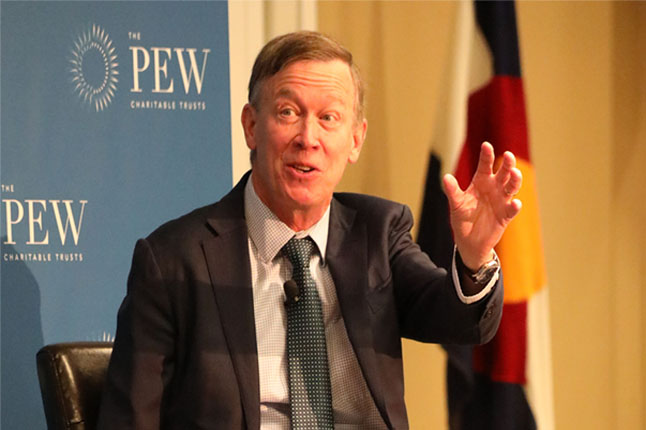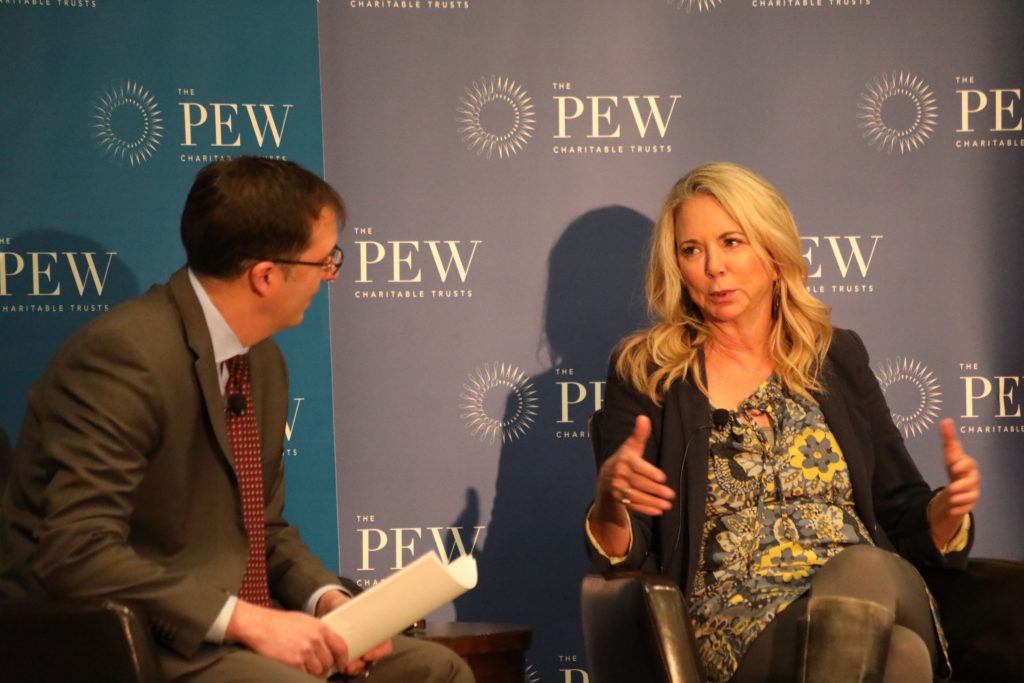

As John Hickenlooper’s gubernatorial term winds down, his administration is gaining more attention for its philosophy toward regulation.
Pew Charitable Trusts hosted a discussion with Hickenlooper and Kim Jordan, cofounder of the New Belgium Brewing Company, on how states and businesses can work together to promote regulatory compliance. During the discussion, held Tuesday at the History Colorado Center in Denver, moderator and Pew Charitable Trusts vice president Mike Thompson asked Hickenlooper how the state accomplished its regulatory successes, and Jordan weighed in with her perspective in running one of the U.S.’s largest craft brewers.
Pew recently released a study detailing how several states have encouraged economic growth by streamlining their regulatory processes and helping businesses comply with existing standards. The study noted that in 2017, Colorado state agencies reported saving businesses 2.3 million hours of administrative work by eliminating unnecessary compliance tasks.
Hickenlooper reflected on his administration’s “Cut the Burden” program that launched as he took office in 2011. The program’s goal, he said, was to lessen the burden of the state’s public health and environmental regulations as much as possible while “recognizing you need some level of regulations in the world.”
Part of reforming regulation was “getting people to believe in government” through transparency and trust between the regulators and business owners, he said. That meant getting state agencies to track their performance and how much they were costing or saving businesses and the public. But that push for tracking metrics required buy-in from state employees, Hickenlooper said. He tried to appeal to their bottom line.
“I would go to our state employees and say, ‘Right now there’s no appetite in the public to give you a raise … but the way to do this is to demonstrate to the world that you’re saving businesses and our community money,’” Hickenlooper said. “We made sure we measured every way we were saving time and money.”
Hickenlooper said the state reviewed about 24,000 existing rules and regulations and of those, it eliminated or “dramatically simplified” 11,000, saving about $8 million in hard costs.

Burdens on Beer
New Belgium cofounder Kim Jordan said craft brewers like herself face myriad regulations and laws that don’t make sense to them. One example is the Colorado law prohibiting breweries from making hard cider. “I don’t know why, they don’t know why, but that’s what the rule is,” Jordan said.
Predictability is important for business owners, Jordan said. But predictability can be hard to come by in the beverage industry, as states have the right to regulate alcohol on their own terms. In Texas, a beer with more than 6 percent alcohol by volume has to be labeled an “ale.” But the term ale has nothing to do with alcohol content but how the beer is fermented, Jordan noted. Brewers are faced with having to use a different label for their products in Texas based on this arbitrary legal definition.
“There are those kinds of laws all over the United States,” she said.
Government agencies and businesses should try to establish a “trusting relationship” and collaborate to find a “sweet spot” between too much regulation and not enough, Jordan said.
‘The Right Way to Go About Regulation’
In trying to effectively regulate industries, the state government often has to act as a go-between for feuding businesses and interest groups. Hickenlooper gave the example of how his administration regulated methane emissions from oil and gas drilling, seeking a compromise on that issue between the oil and gas industry and environmental groups, which he likened to the “Hatfields and McCoys.”
“The government role was really to … bring people together and create a safe space where everyone felt they were getting a fair shake,” Hickenlooper said. As the proposed rules and the timeline for those rules went through development, the government’s job “was to make sure the feathers got unruffled” whenever one side had an objection to the other’s terms over the 14-month process, he said.
The oil and gas industry spent about $60 million a year through the new emissions framework, which eliminated methane emissions equivalent to about 340,000 vehicles from Colorado roads, he said.
“That to me is the right way to go about regulation … and neither side was perfectly happy,” Hickenlooper said. “But there it is, every year our air is significantly cleaner.”
Colorado as a Case Study
Colorado figures prominently in the new Pew report, “State Strategies to Help Businesses Launch and Expand,” which includes examples of how the state has saved tax dollars by retooling how it carries out certain regulations. One example it mentions is the Colorado Oil and Gas Conservation Commission’s system of prioritizing the oil wells it inspects, visiting higher-risk wells more frequently than those that are located in less populated areas or are more structurally sound.
The report also notes how the state’s Department of Agriculture switched to web-based inspection system, expediting its process for inspecting and approving the safety of animal feed being sold to farmers.
“Improving how states regulate, as distinct from the regulations themselves, has the potential to be a powerful and sustainable economic development strategy,” Melissa Maynard, an economic development expert at Pew who co-authored the report, told Law Week.
She added that when states fix existing regulations and how they’re executed, it doesn’t force their policymakers to choose between cutting regulations and installing new ones.
While the study’s authors didn’t analyze all 50 states and can’t necessarily say Colorado is leading the U.S. in streamlining regulations to spur growth, “Colorado has been tackling this issue across regulatory areas and having results in those areas,” Maynard said.
— Doug Chartier

